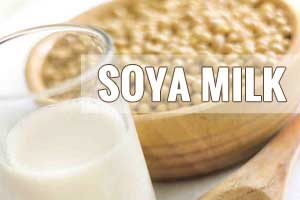- Home
- Editorial
- News
- Practice Guidelines
- Anesthesiology Guidelines
- Cancer Guidelines
- Cardiac Sciences Guidelines
- Critical Care Guidelines
- Dentistry Guidelines
- Dermatology Guidelines
- Diabetes and Endo Guidelines
- Diagnostics Guidelines
- ENT Guidelines
- Featured Practice Guidelines
- Gastroenterology Guidelines
- Geriatrics Guidelines
- Medicine Guidelines
- Nephrology Guidelines
- Neurosciences Guidelines
- Obs and Gynae Guidelines
- Ophthalmology Guidelines
- Orthopaedics Guidelines
- Paediatrics Guidelines
- Psychiatry Guidelines
- Pulmonology Guidelines
- Radiology Guidelines
- Surgery Guidelines
- Urology Guidelines
Soy milk most nutritious plant-based milk for lactose intolerance

Almond milk, Soya milk, rice milk and coconut milk have been promoted as healthy and wholesome options for those who are lactose-intolerant. A new study has been conducted to compare the benefits of different kinds of plant-based milks and it has been found that Soya milk is best of all plant-based milks and has qualities quite similar to Cow’s milk and is most nutritious plant based milk. In fact Soy milk may be termed as most nutritious plant-based milk for lactose intolerance.
The researchers compared the unsweetened versions of the various plant-based milks in all cases and the figures below are based on a 240 ml serving.
Soy milk - the most balanced nutritional profile
- Soy milk is widely consumed for its health benefits linked to the anti-carcinogenic properties of phytonutrients present in the milk known as isoflavones.
- Has been a substitute for cow's milk for 4 decades.
- Concerns, however, are the 'beany flavor' and the presence of anti-nutrients (substances that reduce nutrient intake and digestion).
Rice milk - sweet taste and relatively little nutrition
- Lactose free and can act as an alternative for patients with allergy issues caused by soybeans and almonds.
- Concerns, apart from the high carbohydrate count, is that consumption of rice milk without proper care can result in malnutrition, especially in infants.
Coconut milk - no protein and few calories, but most of them from fat
- Widely consumed in Asia and South America
- Consumption can help reduce levels of harmful low-density lipoproteins (bad cholesterol) that are associated with cardiovascular diseases.
- Nutritional values are reduced if stored for over 2 months.
Almond milk - need for complementary sources of food to provide essential nutrients
- Almonds have a high content of monounsaturated fatty acids (MUFA) that are considered helpful in weight loss and weight management. MUFA also helps in reduction of low-density lipoprotein (bad cholesterol).
Cow's milk benefits & drawbacks
- A wholesome, complete food, providing all major nutrients like fat, carbohydrates and proteins.
- Can help humans by providing a wide range of host-defence proteins because various beneficial anti-microbial effects are found in both human and bovine milks. (E.g., a study shows that in the case of infants, consumption of cow's milk has considerably reduced risk of fever and respiratory infections.)
- But the presence of various pathogens like Salmonella spp and Escherichia coli O157:H7 in milk have been associated with disease outbreaks around the world.
Cow's milk allergy & lactose intolerance
- One of the most common allergies among infants and children affecting 2.2-3.5% of children (a greater percentage than those who are affected by peanuts and tree nut allergies). As many as 35 % of these infants outgrow being allergic to milk by the age of 5-6, and this may increase to 80% by age 16.
- Lactose intolerance, due to the absence or deficiency of the enzyme lactase in the digestive tract, affects somewhere between 15-75 % of all adults depending on race, food habits and gut health.
- Some studies have suggested that 80 % of people of African origin and 100 % of those of Asian and Indigenous American origin are lactose intolerant.
The researchers add that more work will need to be done to understand the effects of various conventional and novel processing methods on the nutritional profile, flavour and texture of these alternative milks.

Disclaimer: This site is primarily intended for healthcare professionals. Any content/information on this website does not replace the advice of medical and/or health professionals and should not be construed as medical/diagnostic advice/endorsement or prescription. Use of this site is subject to our terms of use, privacy policy, advertisement policy. © 2020 Minerva Medical Treatment Pvt Ltd